Joint undergraduate/graduate medical education program aims to advance health equity
By RENEE STOVSKY
Cameron Martin, 32, a second-year physician assistant student at Morehouse School of Medicine, recently completed a clinical rotation in emergency medicine at CHI Memorial Hospital Chattanooga and called it "an absolutely great experience."
"It was very, very busy and involved an incredibly diverse patient load. I did lots of sutures, repaired lots of lacerations, did lots of assessments for COVID-19 and flu. I saw trauma patients, patients suffering from pulmonary embolisms and deep vein thrombosis, pediatric patients and elderly patients with comorbidities," says Martin.
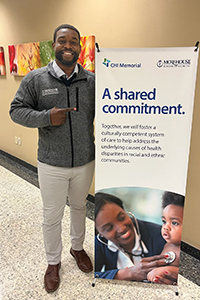
Cameron Martin, a physician assistant student at Morehouse School of Medicine, is part of the first group of Morehouse students to benefit from the More in Common Alliance. That alliance between CommonSpirit Health and the historically Black medical school is expanding opportunities for minority students pursuing health care careers. Martin did rotations at two of CommonSpirit's CHI Memorial hospitals in and around Chattanooga, Tennessee.
"It forced me to think on my feet and utilize everything I had learned in school," he adds. "The staff really mentored me and made every single moment a teaching moment."
Martin's rotation was significant for more than just his individual education, however. He was a part of the first group of Morehouse School of Medicine students — both fourth-year medical students and second-year physician assistant students — to benefit from the first phase of the More in Common Alliance, a 10-year, $100 million joint CommonSpirit Health/Morehouse School of Medicine initiative to increase cultural competency and expand minority representation in clinical care to improve both access and the quality of care patients receive.
For Martin, that is extremely meaningful. A Clemson University graduate with a degree in microbiology, he was an active duty Army officer involved in reconnaissance operations as well as a platoon leader supporting a team of combat medics before enrolling in physician assistant school. Now a captain in the Army Reserve, he says he was drawn to Morehouse School of Medicine because he "loved its mission and commitment to address health inequity."
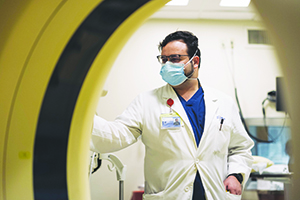
Sami Hudaib, a fourth-year medical student at Morehouse School of Medicine, completed a four-week rotation in the neurology department at CHI Memorial Hospital Chattanooga. Hudaib was one of the first two students welcomed as part of a 10-year effort by the hospital's parent system, CommonSpirit Health, and the medical school to add to the diversity of the clinician workforce in the U.S.
His rotation at CommonSpirit Health's 349-bed CHI Memorial Hospital Chattanooga in Tennessee and at the nearby 74-bed CHI Memorial Hospital Hixson, helped him to round out his experience, he says. Many Morehouse School of Medicine students spend the majority of their time at Atlanta's Grady Memorial Hospital — a large, publicly owned safety net hospital with a Level 1 trauma center. Martin says he appreciated the contrasting experience of his rotations at CHI Memorial community hospitals.
The school provided a rent-free apartment for him in Chattanooga that was 15 minutes from CHI Memorial Hospital Chattanooga. "When I wasn't on rotation, I could enjoy the city, the opportunity for outdoor experiences, and the Southern hospitality there," says Martin, a native of Spartanburg, South Carolina. "I would definitely consider locating in Chattanooga after graduation."
Transient to transplant
That consideration meets another one of the goals of the More in Common Alliance — to support a pipeline of students for communities experiencing a shortage of providers.
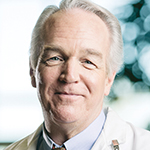
Jackson
"Welcoming these students into our hospital and partnering in their training will help them feel more comfortable in and connected to our community, which increases the likelihood they return to our wonderful city to practice once their training is complete," says Lee Jackson, medical director of surgical services and physician adviser at CHI Memorial.
"African Americans make up 31% of Chattanooga's population and 20% of Hamilton County, Tennessee. There's a huge disparity between that and the percentage of Black medical staff we currently employ," he says. "The physician-patient relationship requires immediate and profound trust, unlike any other relationship I can think of, and one thing that builds trust is the perception that you have something in common with your doctor — that he or she understands the way you view the world. That can go a long way to overcoming the hesitancy to get care."
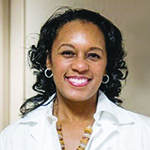
Sutton
That, in fact, was a large part of the motivation behind the formation of the More in Common Alliance. According to Dr. Erica Sutton, associate dean of academic programs and affiliation at Morehouse School of Medicine, the idea for that alliance was hatched in November 2019 by a chance meeting between CommonSpirit Chief Executive Lloyd H. Dean and Dr. Valerie Montgomery Rice, president and chief executive of Morehouse School of Medicine. They were attending the funeral of their mutual friend, Kaiser Permanente Chief Executive Bernard Tyson.
Meeting of the minds
Chicago-based CommonSpirit, one of the largest health systems in America, serves some of the most diverse communities in the country and is a leading provider of Medicaid services. Morehouse School of Medicine, along with three other historically Black medical schools — Howard University College of Medicine in Washington, D.C.; Charles R. Drew University of Medicine and Science in Los Angeles; and Meharry Medical College in Nashville, Tennessee — produce the majority of the nation's Black physicians.
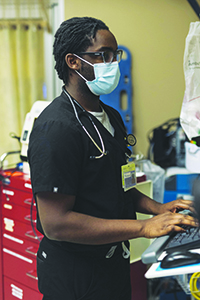
Nicolai Samuels, a fourth-year medical student at Morehouse School of Medicine, at work in the CHI Memorial Hospital Chattanooga emergency department. Samuels completed his four-week ER rotation as part of the CommonSpirit/Morehouse School of Medicine More in Common Alliance.
Both Dean and Rice were well aware of the sobering statistics concerning the dearth of diverse clinicians throughout the U.S. Only 5% of physicians identify as Black, only 11% of the registered nurse workforce is male, and just 27% of board members at the top 100 U.S. hospitals are women. Moreover, in 2019, 22,000 students entered the country's 155 accredited medical schools, but only 1,626 were Black — and only 619 were Black men.
In an effort to advance health equity, the pair began discussing a collaboration to create a joint undergraduate/graduate medical education program. A major goal is to ensure a minimum of 300 clinicians from Black and other minorities underrepresented in health care complete residencies each year. The initiative will open five regional campuses and graduate medical education programs in 10 markets with CommonSpirit facilities.
The collaboration also will allow Morehouse School of Medicine to expand its student population by 6% every year for five years, according to Sutton. And it will help develop research programs to impact illnesses that disproportionately affect African Americans, such as sickle cell disease.
'Something spectacular'
Strategic planning for the alliance began in earnest early in 2020, and sped up dramatically with the onset of the COVID-19 pandemic, which laid bare health inequities in American society; and the murder of George Floyd, which awakened the country to social justice issues, says Marvin O'Quinn, president and chief operating officer of CommonSpirit. He took charge of the project, working directly with Rice with the goal of creating a more diverse workforce as a means to address inequities in health care access and outcomes
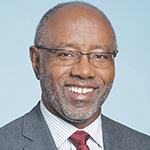
O'Quinn
"We know we are not going to solve all of the country's issues, but we are hoping to begin to have some impact, and create a template that others can follow," says O'Quinn.
"This was a case of having the right people get together at the right time in the right circumstances. CommonSpirit serves a lot of poor communities across the country, and while we do a good job, we know a more diverse, frontline workforce could improve trust issues and diminish cultural misunderstandings. Morehouse School of Medicine has a great vision, and Dr. Rice is a very strong leader who is willing to take risks. Together we see an opportunity to do something spectacular."
Cooperation between Morehouse School of Medicine and CommonSpirit sped the distribution of a tool that has helped people find doctors, vaccines and COVID tests. Morehouse School of Medicine received a $40 million grant from the U.S. Department of Health and Human Services as part of the HHS' National Infrastructure for Mitigating the Impact of COVID-19 within Racial and Ethnic Minority Communities initiative.
The medical school used a portion of the grant on "community-engaged participatory research into vaccination rates and accurate sources of information," says Sutton. "We then developed an app to allow diverse communities to plug in their ZIP codes to determine where to find doctors, vaccines and COVID tests."
Then, according to O'Quinn, CommonSpirit brought in data experts to help roll out the app and a link to it on the Morehouse School of Medicine website.
Of even greater consequence, though, is the launch of the education sites designed to diversify the clinician workforce. Rotations for Morehouse School of Medicine's undergraduate medical students and physician assistant students at CHI Memorial Hospital Chattanooga began in September 2021, with emergency room and neurology rotations. In July, anesthesia and general surgery rotations will be added as well.
Two other first phase undergraduate training sites — at CommonSpirit's Saint Joseph Hospital in Lexington, Kentucky, and Virginia Mason Medical Center in Seattle — are slated to open this spring. The alliance is also initiating the accreditation process to establish new postgraduate residencies and fellowships in three CommonSpirit California locations — Bakersfield, Santa Cruz and Ventura County — and transferring academic sponsorship for an existing program in Los Angeles. Morehouse School of Medicine will be the academic sponsor of these programs.
A leg up
In addition, a $3 million CommonSpirit Equity Impact Scholarship program also was announced in October to "break down barriers in education and create a pathway for job opportunities, promotion, higher compensation and leadership positions that may otherwise seem out of reach," says O'Quinn.
To finance the 10-year More in Common Alliance initiative, Morehouse School of Medicine and CommonSpirit are each contributing seed money from their operating budgets for the first two years of the program. Fundraising will be the third source of financing.
"These remote medical education programs and regional campuses are a tremendous win-win for both hospitals and the communities they serve," says Sutton. "The locations of training opportunities students have greatly influence where they will ultimately practice."
And, at the conclusion of the alliance, Sutton adds, "both MSM and CommonSpirit are hoping to be able to show the value and garner the support to continue this investment."
"That's what relationship building is all about — engagement with the community to foster a pathway by which we will be able to measure our impact through a diversified workforce and the achievement of health equity," she says.